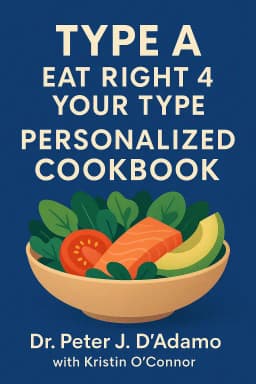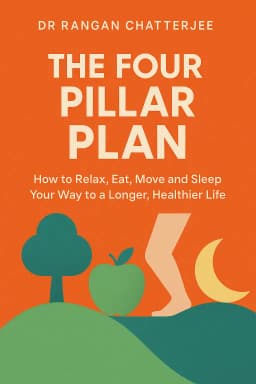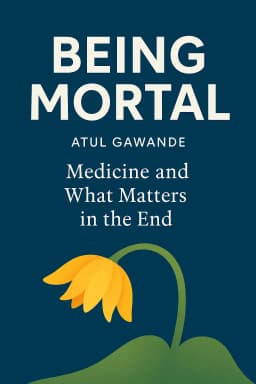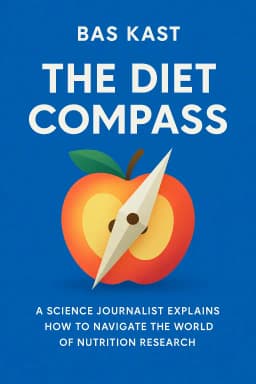
The Unwashed Truth
Golden Hook & Introduction
SECTION
Orion: What if the most dangerous thing in your bathroom isn't a slippery floor, but the very idea that you need to be 'squeaky clean'? For over a century, we've been told that our natural bodies are a problem to be solved. A problem with a name you might recognize, but a history you probably don't: "B.O." or Body Odor. It turns out, that anxiety wasn't discovered in a lab; it was invented in an advertising agency.
eck: That’s a powerful thought. It’s one of those daily rituals, like brushing your teeth or having coffee, that you just don't question. You assume it's always been this way, that it's a fundamental truth of being a civilized person. The idea that it was constructed is… unsettling, but also fascinating.
Orion: Exactly. And that's the journey we're going on today. With my guest eck, a curious and analytical thinker, we're diving into James Hamblin's fascinating book, Clean: The New Science of Skin and the Beauty of Doing Less. We'll tackle this from two perspectives. First, we'll travel back in time to uncover how the very idea of being 'dirty' was manufactured and sold to us.
eck: The historical angle. I love it.
Orion: And then, we'll jump into the cutting-edge science of the skin microbiome to understand what our bodies actually need. It's a journey that will make you rethink your morning shower.
eck: I'm ready. Let's peel back the layers.
Deep Dive into Core Topic 1: The Manufactured Mandate of Cleanliness
SECTION
Orion: Alright, let's start with that history, because to understand our habits, we have to understand how they were sold to us. And it all starts with a product that was once just for laundry: soap. In the late 19th and early 20th centuries, soap wasn't a personal luxury. It was a harsh, industrial product. The book talks about Lifebuoy soap, which was this bright red bar that contained carbolic acid, a disinfectant. It smelled like a hospital.
eck: So not exactly a spa-like experience. It sounds purely functional, even medicinal.
Orion: Precisely. It was marketed as a "health soap" to prevent disease. But its transformation into a personal necessity, a social mandate, is a masterclass in marketing. The story goes that in 1926, the brother of the president of Lever Brothers, the company that made Lifebuoy, was complaining about the smell in his country club locker room after a game of golf. And a lightbulb went off.
eck: Ah, so a problem was identified. Or, perhaps, a problem was about to be created.
Orion: You've got it. The company launched a new ad campaign. At first, it was for "Perspiration Odors." But soon, they streamlined it into a punchy, terrifying new acronym: "B.O." Body Odor. The ads were brutal. They didn't show happy people in showers; they showed people being miserable. A sad-looking woman with the caption, "Why does a girl who has 'everything' fail to get a man?" The answer, of course, was B.O. They showed men losing promotions, friends shunning each other, all because of this newly-named social disease.
eck: That's incredible. It's the classic playbook: invent the disease to sell the cure. They didn't just market a product; they marketed an insecurity. And once that insecurity is in the culture, it's very hard to remove. It becomes a social norm.
Orion: It becomes a social norm that prints money. The book notes that between 1926 and 1930, Lifebuoy's sales quadrupled. They successfully made millions of people afraid of their own natural scent. They took a biological reality and turned it into a social failing that required their product to fix.
eck: It makes you wonder what the modern equivalent of 'B.O.' is, right? What new anxieties are being packaged and sold to us today under the guise of health or wellness? The language has changed—it's more about 'clean beauty' or 'detoxifying'—but the underlying mechanism of creating a sense of lack feels very familiar. It's a powerful reminder that what we perceive as a personal failing is often a manufactured, commercial narrative.
Orion: That's the perfect bridge, because that manufactured fear is so powerful precisely because it runs completely counter to what science is now telling us about our bodies. Which brings us to our second perspective: the microbiome revolution.
Deep Dive into Core Topic 2: The Body as an Ecosystem
SECTION
eck: Right, the shift from seeing the body as a sterile machine to seeing it as a walking, talking ecosystem. This is where it connects so strongly to what we're learning in nutrition about the gut microbiome.
Orion: Exactly. For a century, we've operated under the "germ theory" of health: kill all microbes. But the book introduces the "biodiversity hypothesis," which suggests that health comes from a rich and diverse community of microbes. And the most compelling story to illustrate this is the study of two very similar, yet very different, groups of people: the Amish and the Hutterites.
eck: I've heard a little about this. They're both traditional, rural communities, right?
Orion: Yes, genetically very similar, both originating from the same part of Europe. They don't smoke, they breastfeed, they have similar diets. But there's one key difference in their lifestyles. The Hutterites live on large, industrialized communal farms. Their homes are separate from the barns, and the farming is done with modern machinery. The Amish, on the other hand, live on small, single-family farms. The barn is right next to the house. From the moment they are born, Amish children are in that barn, surrounded by animals, hay, and dirt.
eck: So one group has a much higher and more diverse microbial exposure from infancy.
Orion: A massively higher exposure. Researchers tested the dust in their homes. Amish homes had seven times the level of endotoxins—which are fragments of bacteria—as Hutterite homes. And the result of this difference is staggering. The Hutterites have asthma and allergy rates similar to the average American. Among the Amish? Asthma and allergies are almost nonexistent.
eck: That’s a perfect parallel to what we're learning about the gut microbiome. This idea that diversity is protective, not dangerous, is a huge mental shift. It's not about sterilization; it's about cultivation. You need to train your immune system by exposing it to a wide range of information, and microbes are that information.
Orion: That's the perfect word: "train." The Amish kids' immune systems are constantly being educated by the environment, learning to tell the difference between a real threat and harmless dust or pollen. The Hutterite kids' immune systems are more like sheltered students who panic at the first sign of trouble.
eck: It reframes the author's own experiment of not showering, doesn't it? It's easy to dismiss it as just being "gross," but from this perspective, it's more like an attempt to "re-wild" his own skin's ecosystem. He was trying to stop the daily chemical warfare and see if a more balanced, natural state could emerge. He found his skin became less oily and his eczema improved, which makes sense if you stop stripping away the natural oils and microbes that regulate it.
Orion: Exactly. He found his body reached a new equilibrium. He didn't smell bad, he just smelled… like a person. His body odor was a signal of his lifestyle—stress, diet, sleep—not a sign of being "unclean."
eck: Which is a much more useful and motivating way to think about it. It’s not about shame; it’s about information. Your body is telling you what it needs, and the answer probably isn't another product. It's more likely to be 'go outside' or 'get more sleep.'
Synthesis & Takeaways
SECTION
Orion: So, when you put these two ideas together, it's a powerful contrast. On one hand, we have a century of marketing telling us to fear our own bodies, to scrub away our natural state in pursuit of an artificial, sterile ideal.
eck: And on the other hand, we have this emerging science telling us our bodies are gardens, not battlefields. That they thrive on diversity and that our health depends on cultivating this complex, invisible ecosystem that lives on us and in us. It’s a profound shift from mindless routines to mindful living.
Orion: It really is. The goal of the book, and our conversation, isn't to tell everyone to stop showering. It's about questioning the 'why' behind our habits.
eck: It's about moving from a place of fear to a place of curiosity about our own bodies.
Orion: Perfectly said. So the challenge for our listeners isn't to throw out their soap. It's to become a 'cleanliness detective' for a week. Notice the ads, the packaging, the language on the products in your bathroom and on TV. What are they really selling you? Fear, or function?
eck: I love that. It’s about reclaiming your agency from these powerful marketing narratives. It’s not about being dirty or clean. It’s about being aware. And for anyone interested in motivation and health, that awareness is the first and most important step.
Orion: Couldn't agree more. eck, thank you for bringing such a thoughtful and analytical perspective to this.
eck: This was a blast. Thanks for having me, Orion.









